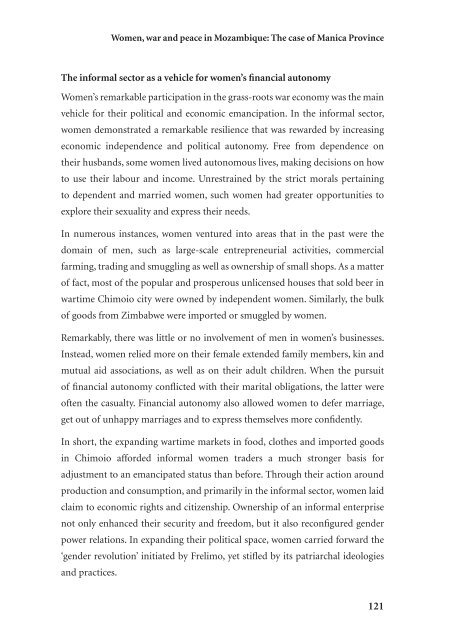ACCORD-ajcr-2015-1
ACCORD-ajcr-2015-1
ACCORD-ajcr-2015-1
- No tags were found...
Create successful ePaper yourself
Turn your PDF publications into a flip-book with our unique Google optimized e-Paper software.
Women, war and peace in Mozambique: The case of Manica Province<br />
The informal sector as a vehicle for women’s financial autonomy<br />
Women’s remarkable participation in the grass-roots war economy was the main<br />
vehicle for their political and economic emancipation. In the informal sector,<br />
women demonstrated a remarkable resilience that was rewarded by increasing<br />
economic independence and political autonomy. Free from dependence on<br />
their husbands, some women lived autonomous lives, making decisions on how<br />
to use their labour and income. Unrestrained by the strict morals pertaining<br />
to dependent and married women, such women had greater opportunities to<br />
explore their sexuality and express their needs.<br />
In numerous instances, women ventured into areas that in the past were the<br />
domain of men, such as large-scale entrepreneurial activities, commercial<br />
farming, trading and smuggling as well as ownership of small shops. As a matter<br />
of fact, most of the popular and prosperous unlicensed houses that sold beer in<br />
wartime Chimoio city were owned by independent women. Similarly, the bulk<br />
of goods from Zimbabwe were imported or smuggled by women.<br />
Remarkably, there was little or no involvement of men in women’s businesses.<br />
Instead, women relied more on their female extended family members, kin and<br />
mutual aid associations, as well as on their adult children. When the pursuit<br />
of financial autonomy conflicted with their marital obligations, the latter were<br />
often the casualty. Financial autonomy also allowed women to defer marriage,<br />
get out of unhappy marriages and to express themselves more confidently.<br />
In short, the expanding wartime markets in food, clothes and imported goods<br />
in Chimoio afforded informal women traders a much stronger basis for<br />
adjustment to an emancipated status than before. Through their action around<br />
production and consumption, and primarily in the informal sector, women laid<br />
claim to economic rights and citizenship. Ownership of an informal enterprise<br />
not only enhanced their security and freedom, but it also reconfigured gender<br />
power relations. In expanding their political space, women carried forward the<br />
‘gender revolution’ initiated by Frelimo, yet stifled by its patriarchal ideologies<br />
and practices.<br />
121


